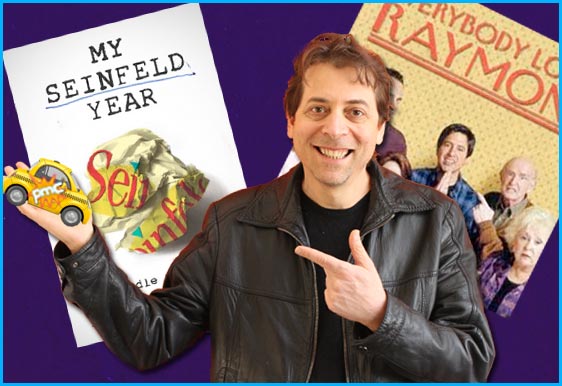The in-demand character actor describes the unique dilemma of typecast success
Fred Stoller goes though life watching people slowly recognize him. Point at him, snap your fingers, scratch your head, search your memory. You don’t know his name, but you’ve seen him on TV, most notably in a classic Seinfeld episode in which his character does not remember meeting Elaine, causing Elaine to become obsessed with him.
Is the lightbulb above your head flickering now?
He says, “A lot of times, people come up to me and say, ‘Where do I know you from?’ Or they go, ‘Are you famous? It’s like, if you have to ask, I’m not.”
Our obsession with Fred is already as familiar and comfortable as endless reruns. In the last decade alone, the New York native (accent intact) has made countless appearances everywhere you need to be, including a semi-regular run on Everybody Loves Raymond.
“I only did one Seinfeld and 8 Everybody Loves Raymonds,” he says. “I say the difference on Raymond between being the cousin and the brother is $77 million.”
It seems that everybody loves Fred too. His calling card: playing the clueless schmuck, the waiter you love to hate, Man#2. Yet it takes somebody rather smart to play somebody that dumb, over and over and over again.
“In a way, it’s frustrating,” he says, “because people recognize me and they think I’m rich. They think I have a big house.”
His memoir, Maybe We’ll Have You Back, details the life of a character actor and the frustration of always being the bridesmaid but never the bride. That lifestyle includes a lot of downtime.
“I walk around aimlessly,” he says about his longtime LA home turf. “People will recognize me and think I’m a star. They’ll say, ‘I hate to bother you,’ but I’m so glad that they are going to break up the isolation.”
With a resume that includes Scrubs, Hannah Montana, My Name Is Earl, and Friends, we want to assure Hollywood that we can stand Fred in more than just small doses. Now if Hollywood would just man up and do the right thing.
“I learn to come to terms with it,” he says. “The first thing is to be frustrated. People would say, ‘You were so great on Seinfeld and on Raymond. What are you doing wrong? Why hasn’t it turned into something much bigger?’”
What, there’s no room on TV for a New York neurotic named Fred? Or maybe something even more daring?
“I would like to play a bad guy or a cop,” he says, “but it would take somebody with a vision to say, ‘Fred would be interesting as something else.’ It’s easy to go, ‘Oh, he’s the nebbish,’ or ‘He’s the guy who comes on as the delivery guy.’ Do I think it will ever happen? I don’t know. I hope so.”
His vast resume includes writing credits as well, highlighted by a year on Seinfeld, where he would ultimately work on both sides of the camera and contribute an uber-classic episode.
“I wrote the one about Kenny Banya,” he says, “because in real life somebody gave me an Armani suit in exchange for a meal.”
However, ultimately Fred felt more comfortable playing than writing.
“Larry David is what he seems,” Fred recalls of working under the Seinfeld co-creator. “He always seems like he’s shouting when he talks, so I felt intimidated.”
Still, Larry saw something, and invited Fred back as an actor. Seinfeld was indeed a show about nothing, but it was also about brilliant casting.
“The next year, acting in the episode, I felt more like myself, and it was a much warmer experience,” Fred says. “Julia Louis Dreyfus, who I did my scenes with, was very nurturing. Michael Richards was not familiar with my persona or my stand up. He just knew me as a writer at the table read. He thought I was holding back, as if I made a character choice. But that was the real me.”
The real Fred is what started his engine as the go-to sitcom schmuck. Not a bad start.
“Talk about classic,” Fred says of the iconic series. “We were shooting a scene at Monk’s Diner, and [my character] walked up to talk to Jerry and George. Just to be in that diner in any context, even as an extra, was amazing. I only did one episode, but people would say, ‘Oh, you were in a bunch.”
That’s the deja vu feeling you often get with Fred. His performance is so satisfying that you can’t recall that you are only getting scraps instead of an entire meal.
“I’m not lucky in that I’m very distinctive,” he says, “but it’s liberating to go, ‘This is what I am.’”
Yet things are already looking up:
I’m actually doing a low-budget horror movie this week,” he says, “where I finally don’t get to play the nebbish. I get killed in it.
For more information on Fred, click here.

